
Paddy and Water Environment
Scope & Guideline
Exploring the synergy between agriculture and environmental preservation.
Introduction
Aims and Scopes
- Sustainable Water Management:
The journal emphasizes innovative water management practices in paddy cultivation, including irrigation techniques, water quality assessments, and the impact of water scarcity on crop yield. - Climate Change Adaptation:
Research often focuses on the effects of climate change on paddy production, exploring adaptive strategies and resilience building for rice farmers in various climatic regions. - Soil Health and Fertility Management:
The journal publishes studies on soil amendments, nutrient management, and the effects of different cultivation practices on soil health, emphasizing sustainable agricultural practices. - Environmental Impact Assessments:
Papers frequently analyze the environmental impacts of paddy farming, including greenhouse gas emissions, water pollution, and biodiversity conservation. - Technological Innovations and Precision Agriculture:
The journal highlights the integration of technology in paddy farming, including remote sensing, machine learning, and IoT applications to enhance productivity and resource efficiency. - Socioeconomic Aspects of Paddy Farming:
Research also delves into the socioeconomic factors affecting paddy farmers, including policy analysis, farmer decision-making, and community engagement in sustainable practices.
Trending and Emerging
- Integrated Water Resource Management (IWRM):
There is a growing focus on IWRM approaches, which consider the holistic management of water resources to optimize agricultural productivity while ensuring sustainability and environmental conservation. - Climate Resilience and Adaptation Strategies:
Increasing attention is being devoted to developing climate-resilient agricultural practices, including studies on the impact of extreme weather on rice production and adaptation strategies for farmers. - Use of Advanced Technologies:
The adoption of technologies such as remote sensing, machine learning, and IoT for precision agriculture in paddy fields is on the rise, highlighting a trend towards data-driven decision-making. - Biodiversity and Ecosystem Services:
Research is increasingly exploring the role of biodiversity in paddy ecosystems, examining how diverse farming practices can enhance ecosystem services and resilience. - Sustainable Waste Management Practices:
Emerging studies focus on the sustainable management of agricultural residues, such as paddy straw, emphasizing their role in improving soil health and reducing greenhouse gas emissions. - Socioeconomic Impacts of Agricultural Policies:
There is a notable increase in research analyzing the socioeconomic effects of agricultural policies on paddy farmers, particularly in relation to technology adoption and market access.
Declining or Waning
- Traditional Irrigation Practices:
There has been a noticeable decline in research focused solely on traditional irrigation practices, as the journal increasingly emphasizes innovative and modern methods that enhance water efficiency. - Paddy Cultivation in Isolation:
Studies that examine paddy cultivation without considering its interconnectedness with other agricultural practices or environmental factors are becoming less frequent, reflecting a shift towards more integrated approaches. - Historical Analysis of Rice Cultivation:
Research centered on historical trends in rice cultivation seems to be diminishing, as current studies prioritize contemporary challenges and future-oriented strategies. - Basic Agronomic Studies:
Basic agronomic research, such as studies solely focused on yield comparisons without addressing environmental or technological implications, is less prominent, indicating a shift towards multidisciplinary approaches. - Focus on Single Crop Varieties:
The journal is moving away from research that concentrates on single rice varieties, towards studies that explore diverse cropping systems and their impacts on sustainability.
Similar Journals
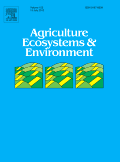
AGRICULTURE ECOSYSTEMS & ENVIRONMENT
Transforming Knowledge into Sustainable SolutionsAGRICULTURE ECOSYSTEMS & ENVIRONMENT is a premier journal published by Elsevier, specializing in the fields of agronomy, animal science, and ecology. With an impressive impact factor reflective of its stature, it ranks in the top quartile (Q1) across three significant categories, highlighting its critical role in advancing research within the agricultural and environmental sciences. The journal serves as a vital platform for disseminating high-quality research that addresses the complex interactions between agriculture and ecosystems, providing insightful methodologies and findings that inform sustainable practices. As the journal continues to converge from 1983 and through to 2025, it remains committed to offering both traditional and innovative access options while contributing to the academic community's understanding of pressing environmental challenges. Researchers, professionals, and students are encouraged to engage with the journal's comprehensive content, which is positioned among the elite in its fields, having achieved top rankings in Scopus across relevant disciplines.
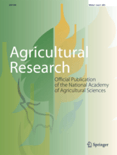
AGRICULTURAL RESEARCH
Bridging knowledge and practice in agronomy and crop science.AGRICULTURAL RESEARCH is a distinguished academic journal published by SPRINGER INDIA, focusing on the dynamic fields of Agronomy, Crop Science, and Food Science. With an ISSN of 2249-720X and E-ISSN of 2249-7218, this journal has established itself as a valuable resource for researchers, professionals, and students dedicated to advancing agricultural knowledge and practices. The journal is recognized in the 2023 Scopus Rankings, achieving commendable quartile positions, including Q2 in Agronomy and Crop Science and Plant Science, as well as Q3 in Food Science, indicating its influential presence in the academic community. AGRICULTURAL RESEARCH aims to disseminate cutting-edge research findings, innovative methodologies, and comprehensive reviews, fostering collaboration and discussion among scholars in Switzerland and beyond. Through its commitment to scholarly excellence, this journal is pivotal in addressing contemporary challenges in agriculture, ensuring sustainability, and enhancing food security for the future.

Transactions of the ASABE
Innovating practices for a resilient agricultural future.Transactions of the ASABE is a premier journal published by the American Society of Agricultural and Biological Engineers, specializing in innovative research and practical applications in the fields of agricultural and biological engineering. With an ISSN of 2151-0032 and E-ISSN 2151-0040, this journal has established a vital niche in disseminating high-quality scholarly content that addresses the complex challenges faced in agriculture and biological systems. The journal operates under an open access model, facilitating broad dissemination of research findings to a global audience. This commitment to accessibility is reflected in its coverage of diverse topics, including agriculture, soil science, food science, and environmental engineering. Although the journal's coverage in Scopus was discontinued in 2021, it once ranked among the top in its categories, indicating its significant contribution to advancing knowledge in these essential fields. Researchers, practitioners, and students are encouraged to engage with the Transactions of the ASABE to stay abreast of developments and foster collaboration in promoting sustainable engineering solutions.
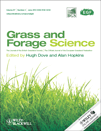
GRASS AND FORAGE SCIENCE
Fostering Ecological Awareness in Grass and Forage ScienceGrass and Forage Science is a premier journal published by Wiley, dedicated to advancing the fields of agronomy and crop science, as well as environmental science management. With its ISSN 0142-5242 and E-ISSN 1365-2494, this esteemed journal has been a cornerstone of scholarly communication since its inception in 1946, and it continues to provide critical insights into the cultivation and sustainability of grasslands and forage systems through to 2024. Recognized within the academic community, it holds a distinguished Q1 ranking in Agronomy and Crop Science and a Q2 ranking in Management, Monitoring, Policy and Law, highlighting its significant impact and contribution to these essential domains. Researchers, professionals, and students alike benefit from the rigorous peer-reviewed articles that address contemporary challenges and innovations in land management, grassland farming, and ecological sustainability. While the journal operates under a subscription model, its breadth of expertise makes it an invaluable resource for anyone engaged in agricultural and environmental sciences. In an era where sustainable practices are paramount, Grass and Forage Science stands at the forefront, driving the conversation and fostering advancements in the way we manage and utilize our natural resources.

Economia Agraria y Recursos Naturales
Empowering Voices in the Quest for Environmental SolutionsEconomia Agraria y Recursos Naturales, published by UNIV POLITECNICA VALENCIA, EDITORIAL UPV, is a prominent open-access journal that has been serving the fields of agricultural and biological sciences, environmental science, and geography since 2001. With an ISSN of 1578-0732 and an E-ISSN of 2174-7350, this journal is dedicated to publishing high-quality research that contributes to the sustainable management of natural resources and agricultural practices. The journal invites scholars, practitioners, and students to explore and share innovative findings that address pressing environmental challenges. While currently categorized in the lower quartiles (Q4) for various disciplines in 2023, its open-access model ensures wide dissemination and visibility for authors and their work, aligning with the growing trend towards accessibility in academic publishing. Positioned in Spain, Economia Agraria y Recursos Naturales is a valuable resource for those seeking to engage with the intersection of agriculture, environmental studies, and policy planning within a global context.
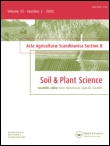
ACTA AGRICULTURAE SCANDINAVICA SECTION B-SOIL AND PLANT SCIENCE
Advancing Sustainable Agriculture Through Soil and Plant ScienceACTA AGRICULTURAE SCANDINAVICA SECTION B-SOIL AND PLANT SCIENCE, published by Taylor & Francis AS, is a distinguished journal dedicated to the fields of Agronomy, Crop Science, and Soil Science. With an impressive impact factor, and categorized in Q2 for both Agronomy and Crop Science and Soil Science as of 2023, this journal is an essential resource for researchers, professionals, and students aiming to advance their understanding of soil-plant interactions and sustainable agricultural practices. Operating since 1992 and continuing through to 2024, ACTA aims to publish high-quality, peer-reviewed research that encourages the applicability of advanced scientific knowledge in real-world agricultural settings. While the journal is not open access, it remains widely accessible through institutional subscriptions, reflecting its commitment to disseminating essential findings and fostering innovation in soil and plant science worldwide. Nestled in the vibrant academic environment of Norway, ACTA AGRICULTURAE SCANDINAVICA serves as a key platform for nurturing groundbreaking research that informs sustainable agricultural policies and practices globally.

AGROCIENCIA
Driving progress in agronomy and environmental science.AGROCIENCIA, published by COLEGIO POSTGRADUADOS, is a key journal in the fields of agronomy, animal science, and environmental science in Mexico. With an ISSN of 1405-3195 and an E-ISSN of 2521-9766, this journal has been a crucial platform for disseminating research findings since its inception in 2000. Operating from Montecillo, Estado Mexico, it provides an outlet for scholars and practitioners to share innovations and insights that directly impact agricultural practices and environmental sustainability. Despite its current categorization in the Q4 quartile across multiple disciplines, AGROCIENCIA strives to elevate the quality and reach of research, fostering a collaborative approach to tackle pressing issues within the agricultural sciences. Access options are primarily through institutional subscriptions, allowing for a diverse audience of researchers, professionals, and students to engage with the latest studies aimed at advancing knowledge in the agricultural sector. As the journal converges towards its 2024 milestone, it remains dedicated to enhancing scientific inquiry and promoting effective solutions within its discipline.
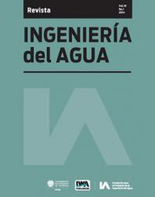
Ingenieria del Agua
Transforming Challenges into Opportunities in Water ManagementIngenieria del Agua, published by Universitat Politècnica de València, Editorial UPV, is a prominent open-access journal dedicated to the field of water engineering and management. With its ISSN 1134-2196 and E-ISSN 1886-4996, this journal has been facilitating the dissemination of critical research and innovative practices in water resources since 1994. With a commitment to providing unrestricted access to high-quality research, Ingenieria del Agua aims to serve as a pivotal platform for researchers, professionals, and students alike. Focused on the intersection of hydrology, environmental engineering, and sustainability, the journal encourages submissions that address contemporary challenges in water resource management, promoting advancements that are vital for both ecological conservation and societal needs. By fostering a collaborative academic environment, it plays an essential role in shaping the future of water engineering.

Agrosystems Geosciences & Environment
Championing open access to vital environmental research.Agrosystems Geosciences & Environment, published by WILEY, is a premier open access journal dedicated to advancing the interdisciplinary field of agricultural and environmental sciences. With an E-ISSN of 2639-6696, the journal has gained recognition since its inception in 2018, currently holding a Q2 ranking in Agricultural and Biological Sciences, Plant Science, and Soil Science. Operating from the United Kingdom, Agrosystems Geosciences & Environment contributes significantly to knowledge generation and dissemination, offering vital insights into sustainable practices, soil management, and crop optimization. Researchers and professionals will find the open access model particularly advantageous, promoting greater visibility and engagement within the scientific community. By bridging the gap between geosciences and agrosystem management, this journal is vital for those committed to addressing today's critical environmental challenges.

Journal of Agriculture and Environment for International Development
Transforming Challenges into Opportunities in Agri-EnvironmentJournal of Agriculture and Environment for International Development, published by AGENZIA ITALIANA COOPERAZIONE SVILUPPO-ITALIAN DEV COOP AGENCY, is a vital platform advancing research at the intersection of agricultural practices, environmental sustainability, and international development. Since its inception, this Open Access journal has aimed to disseminate knowledge and innovative strategies that address global challenges in the agri-environment sector. With ISSN 2240-2802, this esteemed publication is situated in Italy and has maintained an unwavering commitment to accessibility since 2011, encouraging widespread engagement amongst researchers and practitioners. Although currently ranked in the Q4 quartile across various categories including Agricultural and Biological Sciences and Environmental Science, the journal is dedicated to covering crucial topics that contribute to sustainable development, thus serving as an invaluable resource for scholars and policymakers alike. The convergence years from 2016 to 2024 reflect the journal's adaptive approach to evolving global trends, ensuring its relevance in a rapidly changing academic landscape.